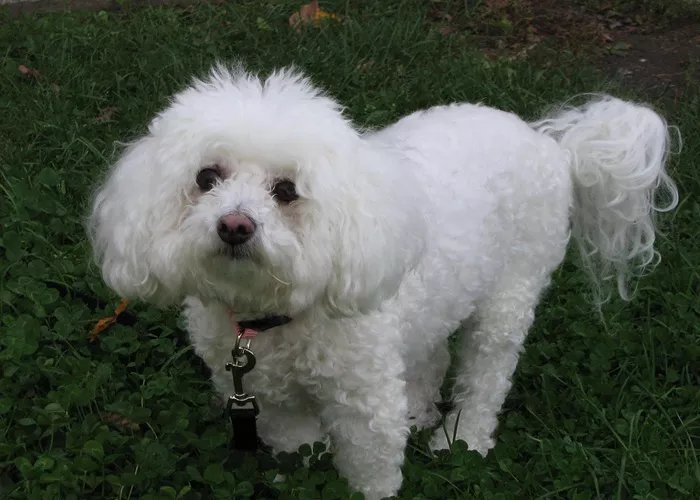The Bichon Frise, with its cloud-like white coat and cheerful personality, is a beloved companion for families worldwide. One of the most common questions from owners is: How long do these fluffy dogs live? This article explores the lifespan of Bichon Frises, factors influencing their longevity, and actionable tips to help them thrive.
Average Lifespan of a Bichon Frise
Bichon Frises typically live 12–15 years, with some reaching up to 16 years under optimal care. This lifespan is relatively long compared to other small breeds, such as Chihuahuas (12–20 years) or Shih Tzus (10–16 years). However, their longevity depends heavily on genetics, lifestyle, and preventive healthcare.
Key Factors Affecting a Bichon Frise’s Lifespan
Genetic Health
Bichon Frises are generally healthy, but they are prone to specific hereditary conditions:
Patellar Luxation: A knee joint issue common in small breeds, causing limping or arthritis.
Allergies: Skin and food allergies may lead to chronic itching or infections.
Dental Disease: Their small mouths make them susceptible to plaque buildup and tooth loss.
Eye Problems: Cataracts and tear duct issues are frequent due to their prominent eyes.
Reputable breeders screen for these conditions, reducing risks for puppies.
Diet and Nutrition
A balanced diet is critical:
Puppies: Require high-protein food (22–28% protein) for muscle development.
Adults: Need controlled calories to prevent obesity, which strains joints and shortens lifespan.
Seniors: Benefit from fiber-rich diets to support digestion and joint supplements like glucosamine.
Avoid foods with artificial additives or excessive salt, which worsen tear stains—a common issue in Bichons.
Exercise and Mental Stimulation
Bichons are energetic and require 30–60 minutes of daily activity, such as walks, fetch, or scent games. Without exercise, they may develop anxiety or destructive behaviors, indirectly affecting their health.
Grooming and Hygiene
Their hypoallergenic, curly coat requires weekly brushing to prevent mats and skin infections. Regular ear cleaning (using vet-approved solutions) prevents infections, while dental chews or brushing reduces periodontal disease risk.
Veterinary Care
Routine checkups (at least annually) help detect issues early:
Vaccinations: Protect against parvovirus, distemper, and rabies.
Parasite Control: Monthly flea/tick prevention and deworming.
Blood Tests: Monitor organ function in senior dogs.
How to Extend Your Bichon’s Lifespan
Feed High-Quality Food
Choose grain-free or limited-ingredient diets to minimize allergies. Incorporate omega-3 fatty acids (e.g., fish oil) for skin and coat health.
Maintain a Healthy Weight
Obesity reduces lifespan by up to 2 years. Use portion control and avoid table scraps. A healthy Bichon should have a visible waistline and ribs that can be felt but not seen.
Prioritize Dental Health
Brush their teeth 2–3 times weekly with dog-safe toothpaste. Dental toys or water additives can supplement brushing.
Socialize and Train Early
Bichons are intelligent but stubborn. Positive reinforcement training reduces stress and builds confidence, preventing anxiety-related health issues.
Create a Safe Environment
Toxic Substances: Keep chocolate, xylitol, and grapes out of reach.
Stress Reduction: Provide a quiet space during fireworks or thunderstorms.
Common Health Issues and Prevention
| Health Problem | Symptoms | Prevention |
|---|---|---|
| Allergies | Itching, redness, ear infections | Hypoallergenic diet, regular baths4 |
| Luxating Patella | Limping, reluctance to jump | Weight management, joint supplements7 |
| Dental Disease | Bad breath, tooth loss | Daily brushing, dental chews7 |
| Tear Stains | Red/brown streaks under eyes | Wipe daily with saline solution, avoid tap water11 |
Senior Bichon Care (7+ Years)
As Bichons age, their needs change:
Diet: Switch to senior-formula food with added fiber and reduced calories.
Exercise: Shorter, gentler walks to avoid joint strain.
Cognitive Health: Puzzle toys prevent dementia, which affects 60% of dogs over .
Comfort: Orthopedic beds ease arthritis pain.
Myths About Bichon Lifespan
Myth 1: “Indoor Dogs Live Longer”
While indoor living reduces accident risks, Bichons still need outdoor stimulation for mental health.
Myth 2: “Supplements Guarantee Longevity”
Over-supplementing (e.g., excess calcium) can harm kidneys. Always consult a vet.
Myth 3: “Spaying/Neutering Shortens Lifespan”
Studies show spayed/neutered dogs live 1–3 years longer due to reduced cancer risks.
Case Study
Background
Bella, a Bichon from Texas, lived to 16. Her regimen included:
Diet: Fresh-cooked chicken, brown rice, and blueberries.
Exercise: Daily 20-minute walks and indoor play.
Healthcare: Biannual vet visits and acupuncture for arthritis.
Key Takeaway: Consistency in diet, exercise, and preventive care maximized her lifespan.
Conclusion
With proper care, a Bichon Frise can be a joyful companion for over a decade. Their lifespan hinges on a balance of nutrition, exercise, grooming, and proactive healthcare. By understanding their unique needs—from puppyhood to senior years—you can ensure your “cotton ball” lives a long, vibrant life.
Related Topics:
IS A MALE OR FEMALE BICHON FRISE BETTER?
HOW OFTEN DOES A BICHON FRISE NEED TO BE WALKED?
WHY ARE BICHON FRISES SO CLINGY?


